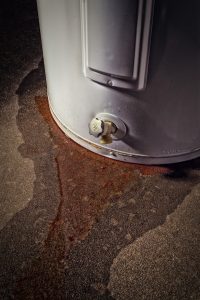Your water heater is one of those things you might almost never think about until you end up taking a surprisingly cold shower. But you’ll be better off and better able to avoid cold showers if you do stop and consider your water heater from time to time.
How well is your water heater working? When was the last time you had it serviced? Have you taken a peek at it lately to see if anything is visibly wrong? If you do have water heater issues, does that mean it needs repair? Or is it time to replace your water heater? We’ll help clarify things for you.
How Old Is Your Water Heater?
How old is that water heater getting to be? Under ideal circumstances, a tank water heater should last ten to fifteen years. Tankless systems can last longer, occasionally even a little beyond twenty years. If you’re not sure, check the water heater’s serial number or the owner’s manual and you should be able to figure it out.
Visible Signs of Wear or Damage
Have you been getting regular maintenance for your water heater? Having the sediment and mineral scaling flushed out of the system, having the pressure and temperature tested and recalibrated if necessary, and having the anode rod replaced are all very important for maximizing the lifetime of the system. Without this, it’s much less likely that your water heater will survive for ten years. If you’re unsure what kind of upkeep your system needs, this post on why your water heater needs regular maintenance outlines essential steps that can help prevent unnecessary plumbing repair service calls.
Is Your Unit Operating Efficiently?
As a water heater begins to struggle, even regular maintenance can’t keep its efficiency up forever. Whether your water heater uses natural gas or electricity, if you’ve got rising utility bills or rising water bills, your water heater might be the culprit. For example, these signs of a dying water heater may help you decide if repair is worth it or if a full replacement is the better long-term move.
If the water heater is also getting on in age and is in less-than-excellent condition overall, replacement may be a better choice than repair.
Frequent Repairs or Minor Fixes?
Some repair needs are relatively minor. Some can be more extensive, potentially even exceeding half the cost of a new water heater. A minor repair might be worthwhile, even if you know your water heater won’t last many more years. A major repair is only a reasonable plan if the water heater is otherwise in good condition and not very old. If you’re facing this dilemma, this article on when to repair or replace your water heater can help guide your next steps with confidence.
Is Rust or Sediment Affecting Your Water?
Hot water that smells odd or is discolored might be caused by bacteria growing in the water heater. This is a sign that the anode rod must be replaced. It makes the tank a hostile environment for bacteria and corrosion, and this is a simple fix. But if the water is rusty, chances are, the inside of the tank has become corroded. It’s only a matter of time before it springs a leak or bursts, so replacement is necessary.
Whether you need repair or replacement, or you need help determining that, we’re always happy to talk with you about water heaters in Medina, AZ. We’ll help you get back to enjoying your nice, hot showers without any worries.
Contact Crown Group Ohio today with any questions about your water heater or to make an appointment.



